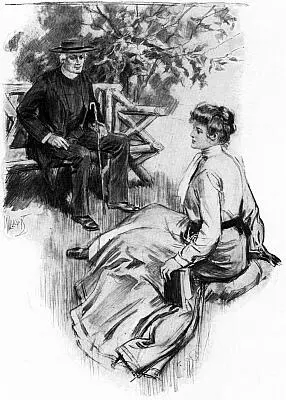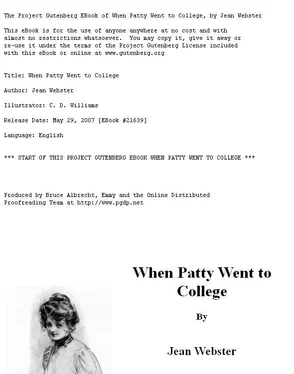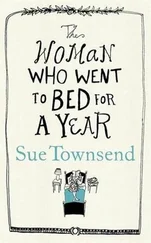Jean Webster - When Patty Went to College
Здесь есть возможность читать онлайн «Jean Webster - When Patty Went to College» весь текст электронной книги совершенно бесплатно (целиком полную версию без сокращений). В некоторых случаях можно слушать аудио, скачать через торрент в формате fb2 и присутствует краткое содержание. Год выпуска: 2007, Жанр: Классическая проза, на английском языке. Описание произведения, (предисловие) а так же отзывы посетителей доступны на портале библиотеки ЛибКат.
- Название:When Patty Went to College
- Автор:
- Жанр:
- Год:2007
- ISBN:нет данных
- Рейтинг книги:4 / 5. Голосов: 1
-
Избранное:Добавить в избранное
- Отзывы:
-
Ваша оценка:
- 80
- 1
- 2
- 3
- 4
- 5
When Patty Went to College: краткое содержание, описание и аннотация
Предлагаем к чтению аннотацию, описание, краткое содержание или предисловие (зависит от того, что написал сам автор книги «When Patty Went to College»). Если вы не нашли необходимую информацию о книге — напишите в комментариях, мы постараемся отыскать её.
When Patty Went to College — читать онлайн бесплатно полную книгу (весь текст) целиком
Ниже представлен текст книги, разбитый по страницам. Система сохранения места последней прочитанной страницы, позволяет с удобством читать онлайн бесплатно книгу «When Patty Went to College», без необходимости каждый раз заново искать на чём Вы остановились. Поставьте закладку, и сможете в любой момент перейти на страницу, на которой закончили чтение.
Интервал:
Закладка:
From the open windows of the chapel she could hear the college chanting: "Lord, have mercy upon us, and incline our hearts to keep this law." She laughed happily to herself; she was not keeping laws to-day. They might stay in there in the gloom, if they wanted to, with their commandments and their litanies. She was worshiping under the blue sky, to the jubilant chanting of the birds.
She was the only person alive and out that morning, and the spring was in her blood, and she felt as though she owned the world. The campus had never seemed so radiant. She paused on the little rustic bridge to watch the excited swirling of the brook, and she nearly lost her balance while trying to launch a tiny boat made of a piece of bark. She dropped pebbles into the pool in order to watch the startled frogs splash back into the water, and she threw her cushion at a squirrel, and laughed aloud at its angry chattering. She raced up the side of Pine Bluff, and dropped down panting on the fragrant needles in the shadow of a tall pine.
Below her the ivy-covered buildings of the college lay clustered among the trees; and in the Sunday quiet, with the sunlight shining on the towers, it looked like some medieval village sleeping in the valley. Patty gazed down dreamily with half-shut eyes, and imagined that presently a band of troubadours and ladies would come riding out on milk-white mules. But the sight of Peters, strolling to the gateway in his Sunday clothes, spoiled the illusion, and she turned to her book with a smile. Presently she closed it, however. This was not the time for reading. One could read in winter and when it rained, and even in the college library with every one else turning pages; but out here in the open, with the real things of life happening all about, it was a waste of opportunity.
Her eyes wandered back to the campus again, and she suddenly grew sober as the thought swept over her that in a few weeks more it would be hers no longer. This happy, irresponsible community life, which had come to be the only natural way of living, was suddenly at an end. She remembered the first day of being a freshman, when everything but herself had looked so big, and she had thought desperately, "Four years of this!" It had seemed like an eternity; and now that it was over it seemed like a minute. She wanted to clutch the present and hold it fast. It was a terrible thing—this growing old.
And there were the girls. She would have to say good-by, with no opening day in the fall—and Priscilla lived in California and Georgie in South Dakota and Bonnie in Kentucky and she in New England, and they were the only people in the world she particularly cared to talk to. She would have to get acquainted with her mother's friends—with chronically grown-up people, who talked about husbands and children and servants. And there would be men. She had never had time to know many men; but some day she would probably be marrying one of them, and then all would be over; and before she had time to think, she would be an old lady, telling her grandchildren stories about when she was a girl.
 I have just run away from you, Bishop Copeley
I have just run away from you, Bishop Copeley
Patty gazed mournfully down on the campus, almost on the verge of tears over her lost youth, when a step suddenly sounded on the gravel path, and she looked up with a startled glance to see a churchly figure rounding the hill. Involuntarily she prepared for flight; but the bishop had spied her, together with a little rustic seat under a tree, and he smiled upon the one and dropped down upon the other with a sigh of content.
"A beautiful view," he gasped; "but a very steep hill."
"It is steep," Patty agreed politely; and as there seemed to be no chance of escape, she resumed her seat and added, with a laugh: "I have just run away from you, Bishop Copeley, and here you come following along behind like an accusing conscience."
The bishop chuckled. "I've run away myself," he returned; "I knew I should have to be introduced to a hundred or so of you after service, so I just slipped out the back way for a quiet stroll."
Patty eyed him appreciatively, with a new sense of fellow-feeling.
"I should like to have run away from church as well," he confessed, with a twinkle in his eye. "Out of doors is the best church on a day like this."
"That's what I think," said Patty, cordially; "but I had no idea that bishops were so sensible."
They chatted along in a friendly manner on various subjects, and exchanged lay opinions on the college and the clergy.
"It's a funny thing about this place," said Patty, ruminatingly, "that, though we have a different preacher every Sunday, we always have the same sermon."
"The same sermon?" inquired the bishop, somewhat aghast.
"Practically the same," said Patty. "I've heard it for four years, and I think I could almost preach it myself. They all seem to think, you know, that because we come to college we must be monsters of reason, and they urge us to remember that reason and science are not the only things that count in the world—that feeling is, after all, the main factor; and they quote a little poem about the flower being beautiful, I know not why. That wasn't what yours was about?" she asked anxiously.
"Not this time," said the bishop; "I preached an old one."
"It's the best way," said Patty. "We're human beings, if we do come to college. I remember once we had a man from Yale or Harvard or some such place, and he preached an old sermon: he urged us to become more manly. It was very refreshing."
The bishop smiled. "Do you run away from church very often?" he inquired mildly.
"No; I don't have a chance when I room with Priscilla. But obligatory chapel makes you want to run away," she added. "It's not the chapel I object to; it's the obligatoriness."
"But you have a system of—er—cuts," he suggested.
"Three a month," said Patty, sadly. "Evening chapel counts as one, but Sunday morning church as two."
"So you expended two cuts to escape me?" he asked with a smile.
"Oh, it wasn't you," Patty remonstrated hastily. "It was just—the obligatoriness. And besides," she added frankly, "my legitimate cuts were used up days ago, and when I once begin over-cutting, I am reckless."
"And may I ask what happens when you over-cut?" the bishop inquired.
"Well," said Patty, "there are proctors, you know, that mark you when you are absent; and then, if they find that you've over-cut, the Self-Government Committee calls you up and asks the reason. If you can't produce a good excuse you are deprived of your privileges for a month, and you can't be on committees or in plays or get leave of absence to go out of town."
"I see," said the bishop; "and will you have to suffer all of those penalties?"
"Oh, no," said Patty, comfortably; "I shall produce a good excuse."
"What will you say?" he inquired.
"I don't know, exactly; I shall have to depend on the inspiration of the moment."
The bishop regarded her quizzically. "Do you mean," he asked, "that, having broken the rule, you intend to evade the penalty by—to put it flatly—a falsehood?"
"Oh, no, bishop," said Patty, in a shocked tone. "Of course I shall tell the truth, only"—she looked up in the bishop's face with an irresistible smile—"the committee probably won't understand it."
For an instant the bishop's face relaxed, and then he grew grave again. "By a subterfuge?" he asked.
"Y-yes," acknowledged Patty; "I suppose you might call it a subterfuge. I dare say I am pretty bad," she added, "but you have to have a reputation for something in a place like this or you get overlooked. I can't compete in goodness or in athletics or in anything like that, so there's nothing left for me but to surpass in badness—I have quite a gift for it."
Читать дальшеИнтервал:
Закладка:
Похожие книги на «When Patty Went to College»
Представляем Вашему вниманию похожие книги на «When Patty Went to College» списком для выбора. Мы отобрали схожую по названию и смыслу литературу в надежде предоставить читателям больше вариантов отыскать новые, интересные, ещё непрочитанные произведения.
Обсуждение, отзывы о книге «When Patty Went to College» и просто собственные мнения читателей. Оставьте ваши комментарии, напишите, что Вы думаете о произведении, его смысле или главных героях. Укажите что конкретно понравилось, а что нет, и почему Вы так считаете.












